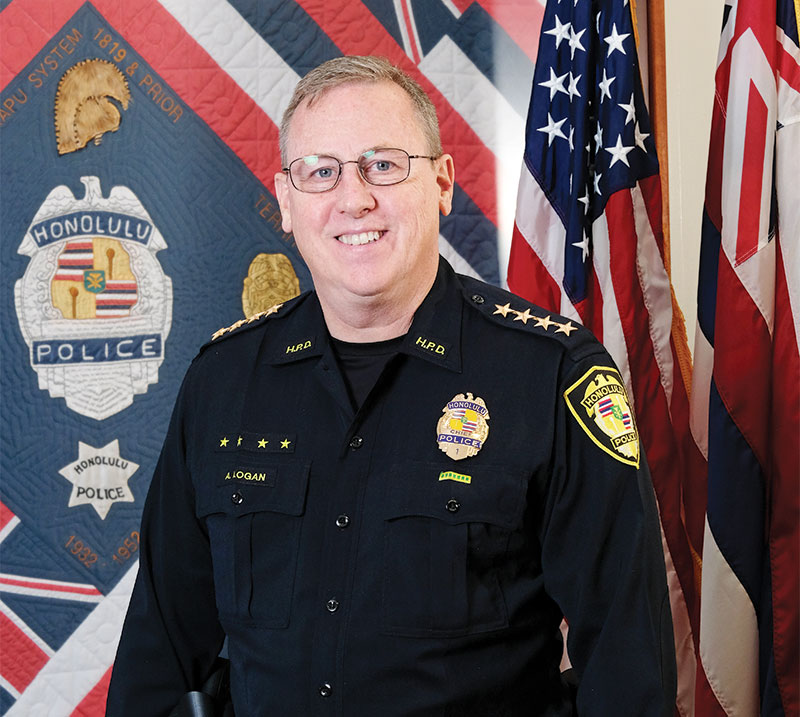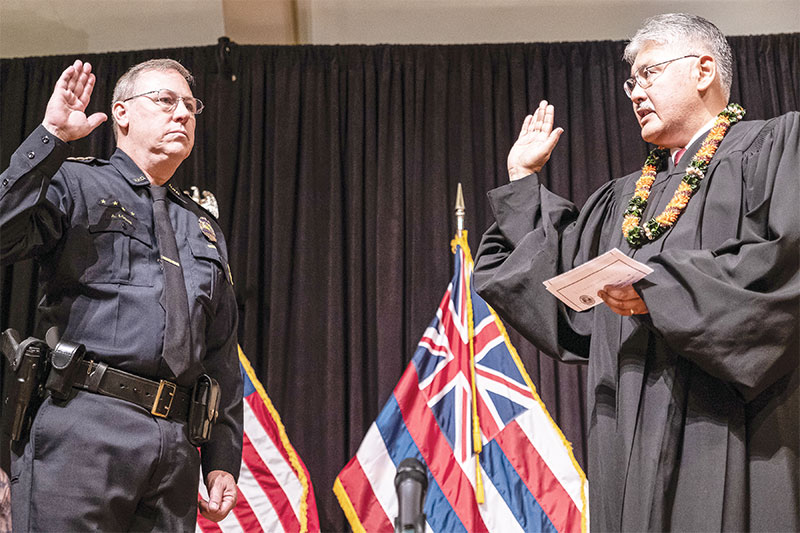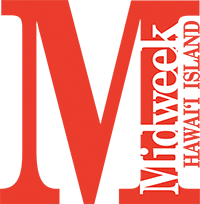Leading Honolulu’s Finest Forward

Photo by LAWRENCE TABUDLO
Honolulu Police Department Chief Arthur “Joe” Logan is proving to be “the right person at the right time” in guiding the law enforcement agency into the future.
If Arthur “Joe” Logan sounds like a pilot experiencing choppy atmospheric conditions these days, you have to forgive him. He’s been steering Honolulu’s principal law enforcement agency for the past year and a half and the journey he’s been on has at times been rocky.
As the city’s 12th police chief notes when describing life at the head of the Honolulu Police Department, “Sometimes it’s been rough, sometimes it’s been turbulent, but that comes with this type of job. You want everything to go smooth and wonderful and just be a nice five-year ride, but things happen.”
Yet despite the occasional lows, Logan is relishing the path he’s on.

First Circuit Court Judge Edward Kubo swears in Arthur “Joe” Logan as Honolulu’s 12th police chief on June 14, 2022. PHOTO COURTESY HONOLULU POLICE DEPARTMENT
“I enjoy getting up every day and going to work,” he says. “I also enjoy the team and, by and large, the past 18 months have been both challenging and fulfilling.”
Presently, he has oversight responsibility for some 1,800 sworn officers and approximately 400 civilian personnel. Thankfully, Logan says he is ably supported by a dependable group of assistant and bureau chiefs, majors, captains, lieutenants, sergeants and more. He also appreciates the department’s hierarchical structure, which allows him to shoulder less of the load because duties are “evenly divided among the leadership.”
“I would say that makes everything somewhat manageable,” he says.
In part because operating in the public eye is nothing new to him, Logan — a self-described introvert (more on this later) — has been a natural for HPD’s top position. From 2015 to 2020, he served as the state’s adjutant general, in which he directed the training and readiness of 5,500 soldiers and airmen in the Hawai‘i National Guard.

Both Gaylene and Joe Logan are passionate artists. Here, they reveal two of their prized creations: carp paintings. PHOTO COURTESY ARTHUR “JOE” LOGAN
Still, he wasn’t sure he wanted to be the one to replace former police chief Susan Ballard when she retired in the summer of 2021. Notwithstanding encouragement from mentors and coworkers, he remained hesitant to apply for the position. In fact, it took a former high school classmate — impressed by Logan’s integrity, work ethic and track record, not to mention a staunch belief that he “was the right person at the right time to lead the department” — to finally convince Logan that his proverbial hat needed to be tossed into the ring.
Then there’s the “servant leadership mantra” that Logan was raised in and which he credits for laying the foundation for his decision.
“My dad was active-duty military and both sides of the family have police officers, so there was always that calling to serve for a purpose higher than self that drove me toward this,” explains Logan, who prior to being sworn in as police chief had briefly worked as a criminal investigator for the State of Hawai‘i Department of the Attorney General. “It really wasn’t a hard decision once I made the leap, but it did take that one phone call from that person to make the difference to apply.”
Of course, he still needed the blessing of his wife, Gaylene, before finally moving forward. She had initially “expressed concern” about him operating in yet another high-profile position so soon after serving as the state’s adjutant general and following his decorated 41-year military career. But after careful consideration, she, too, became convinced that her husband was tailor-made for the extremely demanding city job.
“She’s the hardest-working person I know who runs our household,” says Logan of his marriage partner of 21 years. “I come to work and do my job here, but I think her job is much harder than mine. So, I give her all the credit that is due because one, she’s supported me; and two, she’s the one who’s holding down the fort while I continue in this mission.”
When Logan assumed the department’s controls two summers ago, it was already reeling from the corruption scandal involving former police chief Louis Kealoha. Furthermore, there were other turbulent issues he had to grapple with, including police misconduct concerns and claims of racial profiling of minorities — all of which led to many sleepless nights.
“I was hurting for the department because I watched what happened — not generally with chief Ballard; she was a good chief and did her best — but I think with chief Kealoha before that and what the department went through,” explains Logan. “Then you had the things centered around officers’ actions, based on bringing officers to trial for murder, which is unheard of but seemed to be something that was catching on across the nation.”
Logan acknowledges the growing distrust some in the community have with police — a shared sentiment manifested in other parts of the country in recent years.
“But,” he adds, “I do think there is a large swath of the population that absolutely supports its law enforcement.”
Among the challenges Logan faces is drawing new blood into the force. Recruitment shortages here are no different than what departments are experiencing elsewhere, he says, and some believe the overall disinterest in a law enforcement career is mostly due to negative public perception and generational differences.
Whatever the reasons are for the dwindling number of recruits, Logan and HPD are intent on reversing that trend. To accomplish this in part, they’ve been collaborating with both high schools and universities, hoping to encourage soon-to-be graduates that a career with Honolulu’s finest remains a worthy goal.
“We’re trying to provide a pathway for those individuals to come into the department upon graduation. Perhaps you want to come in on an internship and we’ll then hire you and provide you with jobs so that when you’re age 21, you can enter our police academy,” Logan explains. “Same thing with the universities. Maybe you come in during your senior year as a member of our scientific investigation section? Or, you’re a communications major and you want to look at our communications division where we have officers who handle the radios and the systems that know where officers are and where to send them on calls.”
If Logan has a specific resolution for the new year, it’s that “these programs are successful at bringing people into the department, at least in greater numbers than those who are retiring.”
More so, he hopes to retain the current workforce by emphasizing some of the ideals he’s spent a lifetime championing, including the belief that people often remain where they are happiest.
“Usually when you stay in an organization for a long time, it’s because you enjoy the people you’re with,” he states. “That’s one of the goals I have here with HPD — to ensure that the morale, camaraderie and friendship within the department continue.”
Four decades before Logan submitted his application to replace Ballard, he began filling out another set of papers to join HPD, left it on his dresser overnight and then, to his shock, discovered the very next morning that it was torn to shreds.
“My dog chewed it up,” chuckles the Omaha, Nebraska-born Logan, whose family moved to the islands in 1972 when he was 12. “When I woke up, I found it all over the place. So, I had to re-create the application and get it in by 3 o’clock that afternoon.”
He did just that and, with flying colors, soon passed the test that included a performance exam, a background check and a psychological interview. On June 17, 1982, Logan was one of “around 50 or 60 people” sworn in as the city’s newest police officers.
Since law enforcement is cherished in his family (he also has two brothers who have served in the department), Logan’s arrival as a full-time policeman was somewhat expected. So, too, was his joining the Army Reserves and the Hawai‘i National Guard. Part of his motivation in attaching himself to the military was his interest in mechanical drawing and architecture. At 19, the Army Reserves sent the Saint Louis School graduate to engineering school on the mainland to learn to be a draftsman.
“That’s one of the things that people don’t know about me — that I like to draw. In fact, my wife and I paint and draw together. She’s a very good artist,” says Logan, who keeps one of Gaylene’s finest creations, a colored rock, on his work desk.
But the other reason he chose to serve in both the military and police was to overcome his shyness.
“I was an introvert by nature and I was trying to find a way to break out of that shell. And what better way to do that than by being a leader in both the military and the police department?” says Logan, who during his military career earned a number of awards, including the Distinguished Service Medal, Bronze Star and Meritorious Service Medal; and as a policeman received a Bronze Medal for Merit and was recognized as HPD’s outstanding recruit.
As he pilots HPD into the future, Logan remains resolute in improving the department’s image with the public. He certainly isn’t blind to what he calls “the tarnish that we have to clean up,” and “the discoloration on our uniforms and badges from officers’ actions.” His pledge is “to win back the hearts and minds” of those who might have lost their faith and trust in law enforcement.
“I think the department is in a great place,” states Logan. “Are we perfect? No. Can we get there? Yes. I think with the right people in the right places, which I believe we have for the most part, we can move the department forward.”

